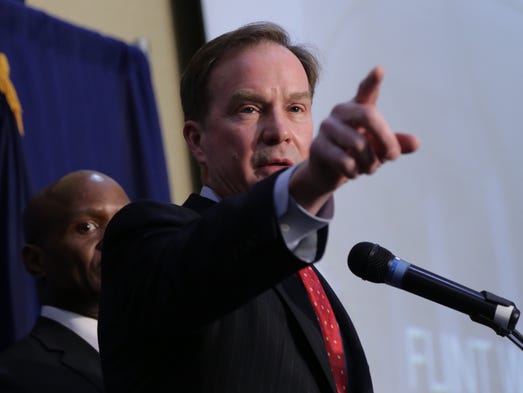 Donald Trump’s recent economic policy address portrayed an economy crippled by “overregulation.” This came on the heels of his convention acceptance speech depicting a country afflicted by a wave of street crime perpetrated by “illegal immigrants.”
Donald Trump’s recent economic policy address portrayed an economy crippled by “overregulation.” This came on the heels of his convention acceptance speech depicting a country afflicted by a wave of street crime perpetrated by “illegal immigrants.”
As with most of Trump’s statements, these comments took real issues and distorted them to the point that that they no longer had much resemblance to reality. There is a regulation crisis in the United States, but the problem is inadequate business oversight, not an excess. And there is a crime wave taking place, but the culprits are not immigrants but rather rogue corporations.
It was particularly odd that Trump chose to mention the auto industry in his rant on regulation. It has apparently not come to his attention that just about all the major carmakers are embroiled in some of the biggest safety and compliance scandals in the industry’s history.
Volkswagen exhibited contempt for the law in its long-standing scheme to circumvent auto emission standards. Since the brazen cheating came to light the company has been scrambling to make amends. It had to agree to spend nearly $15 billion (mostly to compensate customers) to resolve some of its legal entanglements, and it may still face criminal charges with larger potential penalties. While the amounts may seem high, VW is lucky it is being allowed to remain in business.
Then there’s the Japanese company Takata, whose airbags have turned out to be deadly and now is reported to have routinely manipulated test results of its products. General Motors had to pay a $900 million fine and Toyota $1.2 billion, both for safety reporting deficiencies. Electric car producer Tesla, which has taken advantage of a lax regulatory regarding self-driving technology, now faces scrutiny in the wake of several serious accidents involving vehicles operating on autopilot.
Automobiles are far from the only industry with serious regulatory compliance problems. In case we had forgotten the severity of the 2010 Deepwater Horizon catastrophe in the Gulf of Mexico, BP provided a reminder recently when it estimated that its legal and clean-up costs will reach more than $61 billion.
And we must not leave out the banks. In a report I put out in June to accompany the expansion of Violation Tracker, I found that since the beginning of 2010 there have been 144 cases settled against major banks with penalties in excess of $100 million each. In all, the banks have had to pay $160 billion in these cases to resolve allegations relating to a wide range of misconduct: mortgage abuses, defrauding of investors, manipulation of foreign exchange markets and interest rate benchmarks, assisting tax evasion, and much more.
Rampant corporate misconduct is one of the missing issues of the presidential race, especially since Bernie Sanders dropped out. Hillary Clinton’s website has some decent language on the subject but she has hardly made it a central issue in her campaign. In her convention acceptance speech she presented an upbeat picture of American business, and her reference to the auto industry was not to criticize its misconduct but to celebrate that it “just had its best year ever.”
Neither Clinton nor Trump can be expected to be a crusader for corporate accountability, but we need to make sure that whoever is the next occupant of the White House feels pressure to rein in and not unleash big business.
 Bring back manufacturing jobs: For years this has been put forth as the silver bullet that would reverse the decline in U.S. living standards and put the economy back on a fast track. The only problem is that today’s production positions are not our grandparents’ factory jobs. In fact, they are often as substandard as the much reviled McJobs of the service sector.
Bring back manufacturing jobs: For years this has been put forth as the silver bullet that would reverse the decline in U.S. living standards and put the economy back on a fast track. The only problem is that today’s production positions are not our grandparents’ factory jobs. In fact, they are often as substandard as the much reviled McJobs of the service sector.
 The business news is abuzz with
The business news is abuzz with 

 The ongoing corporate crime wave showed no signs of abating in 2015. BP paid a record $20 billion to
The ongoing corporate crime wave showed no signs of abating in 2015. BP paid a record $20 billion to  Volkswagen’s scheme to circumvent federal emissions regulations for millions of its cars cries out for tough prosecution. Yet it
Volkswagen’s scheme to circumvent federal emissions regulations for millions of its cars cries out for tough prosecution. Yet it  In the competition among industries to see which can act in the most irresponsible manner, we have a new winner. After nearly a decade during which banks and oil giants like BP were the epitome of corporate misconduct, the big automakers are now on top.
In the competition among industries to see which can act in the most irresponsible manner, we have a new winner. After nearly a decade during which banks and oil giants like BP were the epitome of corporate misconduct, the big automakers are now on top.
You must be logged in to post a comment.